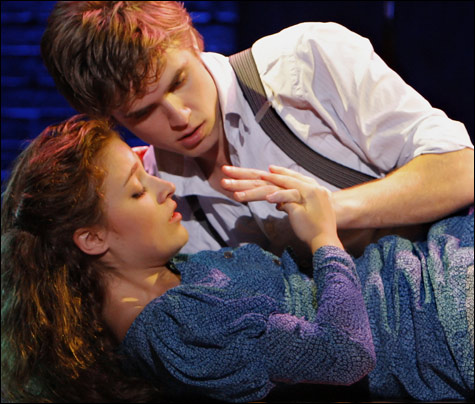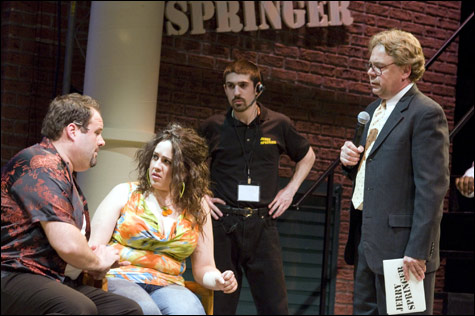
SPRING AWAKENING All the onanism, sado-masochism, abortion, and self-slaughter of Frank Wedekind's original, though with the rape turned into a romance. |
It smells like teen fusion at the Colonial Theatre, where the Tony-winning musical Spring Awakening mingles 19th- with 21st-century adolescent ache and outrage (through May 24). As if at a mixer, the show even seats the scratchy-school-uniformed denizens of Frank Wedekind's then-shocking 1891 play amid audience members in straight-backed chairs on either side of the stage. From there as elsewhere, the characters can rise from their rigid postures and uncomfortable seats, whip a wireless mike from bodice or breast pocket, and commence to wail singer-songwriter Duncan Sheik's now plangent, now furious alt-rock score, the brilliantly conceived outlet for the teens' otherwise repressed or forbidden feelings.
And you know what? Spring Awakening, unlike its predecessor, the over-hyped Rent, is the genuine item: a successful if jagged amalgam of theater and pop music built on Wedekind's sketchy tale of provincial German teens torn between the urgent whispers of their changing bodies and an insensitive adult society (represented by two actors in multiple roles) bent on keeping them biologically in the dark and obedient to the bullying, prudish moral order. Sheik's pulsing, Tony-winning songs do not so much move the story as unlock pent-up emotions either sweet and sultry or, in thrashing numbers like "The Bitch of Living" and "Totally Fucked," mad as hell and not going to take it any more. The show is further enhanced by Tony-winning director Michael Mayer's daringly raw and energetic staging and Bill T. Jones's Tony-winning choreography, less Broadway razzle-dazzle than heightened movement based on dreamy self-caress and bursts of agitated, geometric frenzy.

Are you getting the picture that this unlikely Broadway musical won a lot of Tonys? No shit. Opening on the Great White Way in 2006 following an Atlantic Theater Company production that was preceded by years of workshops, the vibrant collision of surging teen sexuality, contemporary and quaint, from playwright/lyricist Steven Sater and composer Sheik cleaned up at the 2007 Antoinette Perry Awards. One can only hope that means its shepherding director's previous Broadway outing, the innocuous Thoroughly Modern Millie, is a thing of the past.
No small credit should go to Wedekind, whose pioneering play is even harsher than the musical, which retains the onanism, sado-masochism, abortion, and self-slaughter of the original but turns what in the play is a rape into a romance — albeit one consummated in as erotic a scene, set atop a swaying platform standing in for a hayloft, as any ever enacted on Broadway. And that's to say nothing of the protracted masturbation — to a come-hither illustration of Othello's Desdemona, no less — set smack at the center of a production number.
Thank God the creators of Spring Awakening were savvy enough not to update the story of intellectually intense heartthrob Melchior (whose well-intended free-thinking triggers a tragic chain of events), his addled, anxious bumbler of a chum, Moritz, and the sheltered Wendla, (who wants to feel something, even if it's the sting of a switch, and who becomes pregnant because her mother's notion of sex education involves the stork). Instead, Sater and Sheik contrast the damped-down 19th-century adolescents' lockstep public behavior with the private thoughts and feelings expressed in the stomping, raging, yearning interior monologues that form the score.
To Wedekind's roil of unwilling ignorance and hormonal overflow the Broadway show adds sly humor and musical cri de cœur. The latter is delivered at full, leaping yowl or with folkish supplication by an athletic, pure-voiced young cast led by Kyle Riabko as a probing Melchior, Christy Altomare as scared, sensualist-in-training Wendla, and Lost actor Blake Bashoff as a muscular if muddled and extravagantly Eraserheaded Moritz. The singers are backed by an excellent on-stage band conducted by Jared Stein and set against a brick wall decorated with period portraiture and glaring neon accents. Sheik's spare, Tony-winning orchestrations make winning bedfellows of acoustic guitar, electric bass, classical strings, keyboards, and percussion, and Kevin Adams's dramatic lighting makes a glowing hell of adolescence. Like Desdemona, Spring Awakening is worth getting excited by.

JERRY SPRINGER: From here to eternity — or maybe to Hell in a handbasket. |
How do you exaggerate The Jerry Springer Show? The answer is thoughtfully provided by Jerry Springer: The Opera, the Olivier Award–winning London megahit and protest-spurring sacrilege now in its Boston premiere by SpeakEasy Stage Company (at the Calderwood Pavilion through May 30). First you give TV's long-running combative confessional such a pottymouth that, subject to the FCC, it would be bleeped from here to eternity. Then you take it to eternity, by means of a second act that finds Springer moderating a Blakean smackdown in Hell. Most important, you plug the lowlife losers, cheaters, and perverts that are the show's 15-minutes-of-fame-seeking fodder and turn their profane, pathetic extrusions into the high art of opera, with influences ranging from Bach and Handel to Gershwin (not to mention jazz, funk, and Busby Berkeley). There has never been anything quite like this wild ride on the back of Jerry Springer from composer Richard Thomas and stand-up comic Stewart Lee. And if SpeakEasy Stage Company doesn't clear every hurdle, it stays in the saddle with an extravagant, large-cast production that includes swirling projections, a hand-held video cam, tap-dancing Ku Klux Klansmen, and something perilously close to an auto-da-fé.